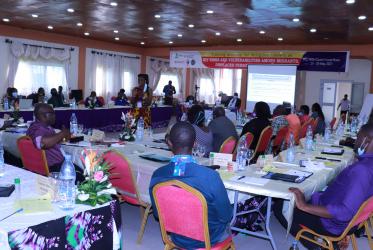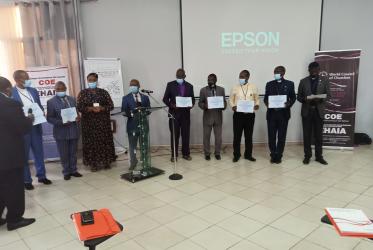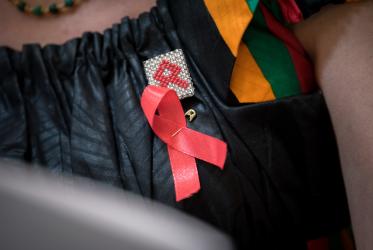Towards a Comprehensive Response in the OSCE Region
Speech by Archbishop em. Dr Anders Wejryd
Many of us think of Europe as a part of the world where respect for the individual, rule under law, care for the citizens and a historic conscience, including knowledge of centuries of often dramatic migration, all that, is present and important. Many of us also know that this is an ideal, but not the all-encompassing reality. Human Rights and Citizens’ Rights are gradually moving into a conflict visible to all. For example, when deciding upon citizenship, Jus soli and jus sanguine make the conflict obvious between more liberal and more conservative traditions.
Migration is seldom undramatic. At the same time, we do know that without migration, no Europe. People have always wandered, moved, being pushed by necessity or being pulled by hope. The main thing we have in common with history is – change.
With immigration new religious traditions and new beliefs come. The newcomers are often far more conscious of their traditions than the ones in the land since long. That threatens many of the old inhabitants. The newcomers often bring experiences of discrimination or animosity from before or prejudices formed in other discourses with them. The relations between some Christians and some Muslims from e.g. the Middle East bear witness about that in some of our countries. The rise of Anti-Semitism in several European countries also has links to that.
Even though we all relate to Europe we have different normalities. Some of our countries look upon themselves as homogeneous, some as more mixed or heterogeneous. Some have profited from open borders and free movements, others have experiences of being subjugated by others. Some of us come from societies where religion has a natural precedence of interpretation, others from societies where the starting point in most public debates is thoroughly secular. We do now, however, all, and I mean all, face the challenges of discrimination and violence based on religion and belief. For the sake of our continued discussion I clearly want to underline that atheism, just like religion, is a belief, not a provable fact.
Religion per se is seldom the root of conflicts. What unfortunately makes a statement like that problematic is what per se means. Lived religion is so intertwined with individuals and their choices and traditional religion so intertwined with or part of culture that it is often hard to decide what is what. At the same time we clearly see how serious and really pious followers of all traditions usually are the ones who most easily and sustainably start and uphold religious dialogue.
All the three Abrahamic religions see God as the creator and upholder of the universe. God is a God for all, upon whom all are dependent, regardless of their beliefs. Of course Judaism, Christianity and Islam all uphold that there is a difference in relation between God and the human person, depending upon the practice, faith or belief of that specific person, but it is always God who is the source of life for every individual. That gives a firm basis for the right to life and is quite possible, as we have seen, to continue to develop.
But religions are in conflict? Maybe so, but don’t forget that normally it is the followers who are in conflict. Religion per se is seldom the root of conflicts but religion often and surely is an important amplifier of conflicts.
Conflicts between religious groups grow stronger in societies under stress. When injustices are growing, when the judicial system does not work, institutions fail and it becomes harder and harder to sustain a family or even yourself, unrest grows. Then you seek your allies and try to spot your enemies. Religious groups, just like social groups, who live separated in daily life often give raise to enemy images. Combatting segregation is a task for all of society: Politics, economics, city-planning – and the civil society. It is the same with combatting poverty. A task for all of society. And with meaningful education: The same, for all of society.
For a long and successful period wealth has been the shared goal in Europe. But - as the old saying goes, in many parts of the world: Money is a beautiful servant but a terrible master. Indeed, money is a beautiful servant. Measurable, exchangeable, helping us to effectively reach our goals – but of no moral whatsoever and with no intrinsic value. When we now do approach the limits of our fossil-driven expansion we face a double challenge: Few expressed values to strive for and severe hindrances to just continuing.
Religions and politics have to be much clearer on our interdependence, between individuals, countries, nature and humanity, religions and generations. We all have to become better at formulating and expressing our deep values and dreams. So much of what we took for granted is not there anymore. One of the values which has to be far more clearly stated is that every real society is a shared society. A society can be built on a shared respect for Life, despite of different background and histories. If values are not there we all become prisoners of money, of materialism – and what is there to live for when that belief does not deliver anymore?
Religions are not the same. They all express a quest for God and the Abrahamic traditions all see God behind life and all things material. They all share the conviction, somewhat differently formulated, that you should do to others what you want them to do to you. But, in all their manifold traditions they often stress different issues. Some traditions are more universalistic, some more particularistic, some more demanding, others more forgiving. For example.
It is a good thing to distinguish between religion and politics. History has taught us that. On the other hand – if religion is left only to the private sphere, it can become just anything – also very dangerous.
Therefore, academic religious studies and research should also be part of public higher education. If religion is not studied, understood, critically scrutinized, publicly discussed, dark corners develop, and we all know what dark corners can hide. If religions are to form a positive factor for the future values in society, our commune bonum, religions have to be allowed into the public sphere and accept the invitation into it.
I am invited as a representative of the ecumenical movement. The word ecumenism share roots with ecology and economy. It is all about oikos, the Greek word for home, house, household. Sometimes ecumenism is seen as trying to find the smallest common denominator for religious traditions and oftentimes ecumenism is simply seen as churches being friendly to each other. The more important meaning of the term, however, is that religions are part of the world and should acknowledge that, by seeking the commune bonum. That common good for humanity and creation includes sharing of one’s faith and belief in word and deed.
The ecumenical movement organizes Orthodox, Anglican, Lutheran and other reformation traditions and works in ever closer cooperation with the Roman-Catholic Church. Since the late sixties the ecumenical movement is also committed to interreligious dialogue and cooperation. A common task for religious groups, civil society and states is now to develop the local, home-based dialogue between men, women and youth. The reality is One God, whom we seek and the vision is One World, despite of different faith and beliefs, because life is from God.
In my manuscript I have put some words and sentences in bold. I will now repeat them:
- Migration is seldom undramatic. At the same time, we do know that without migration, no Europe.
- Religion per se is seldom the root of conflicts.
- Religion per se is seldom the root of conflicts but religion often and surely is an important amplifier of conflicts.
- Religions are not the same.
- Academic religious studies and research should also be part of public higher education.
- Develop the local, home-based dialogue between men, women and youth.





